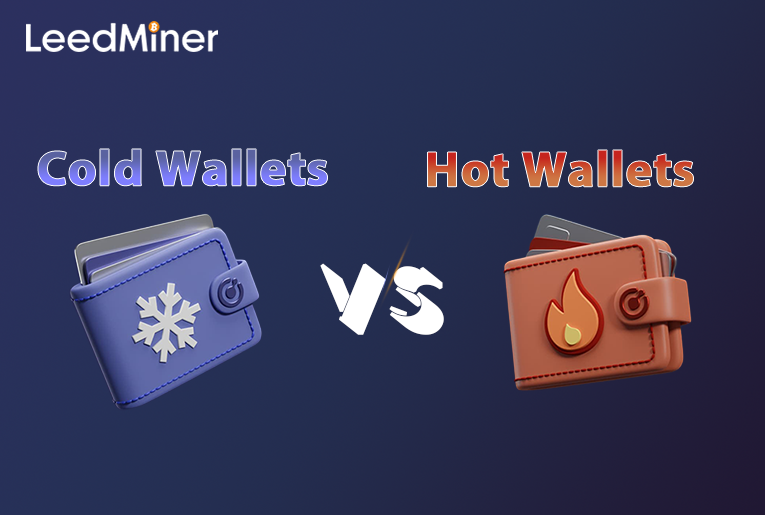SUMMARY
Cryptocurrency wallets are tools used to store, receive, and send digital assets (like Bitcoin, Ethereum, etc.). These wallets are broadly divided into two categories based on their connection to the internet: Hot Wallets and Cold Wallets. Below is a detailed explanation of both, including their features, types, pros and cons, and use cases.
Hot Wallets
What is a Hot Wallet
A hot wallet is a cryptocurrency wallet that is always connected to the internet. Because they are online, hot wallets are easy to use for everyday transactions and quick access to your funds, but they are more vulnerable to cyber threats like hacking and phishing.
Features of Hot Wallets
- Always Online
Hot wallets are connected to the internet, allowing immediate interaction with the blockchain.
- User-Friendly
They usually have a simple and intuitive interface, making them ideal for beginners.
- Suitable for Frequent Transactions
Hot wallets are ideal for daily transactions, smaller amounts, and quick access to your funds.
Common Types of Hot Wallets
- Online Wallets
These are hosted by cryptocurrency exchanges like Binance, Coinbase, where users store funds directly in their exchange accounts.
- Desktop Wallets
Software installed on your computer, such as Electrum (for Bitcoin) or Exodus.
- Mobile Wallets
Apps installed on smartphones, like Trust Wallet or MetaMask.
- Browser Extensions
Wallets that run as extensions in web browsers, like MetaMask and Phantom (for Solana).
Pros and Cons of Hot Wallets
| Pros | Cons |
|---|---|
| Convenient and fast for daily use | Vulnerable to online attacks |
| Easy to set up and use, even for beginners | Requires an internet connection to access |
| Free to use, no additional hardware needed | Less secure for storing large amounts of crypto |
Use Cases for Hot Wallets
- Frequent Traders
Ideal for users who actively buy, sell, or trade cryptocurrencies.
- Small Transactions
Perfect for sending small amounts or using cryptocurrencies in decentralized applications (DApps).
- Fast Access
For users who need quick access to their funds.
Cold Wallets
What is a Cold Wallet
A cold wallet is a cryptocurrency wallet that is not connected to the internet. Cold wallets are used for storing cryptocurrencies securely and are considered much safer for long-term storage because they are offline and therefore less susceptible to hacking.
Features of Cold Wallets
- Offline Storage
Cold wallets store private keys offline, making them immune to online hacking threats.
- Highly Secure
Since private keys never leave the wallet device, cold wallets offer a higher level of security.
- Less Convenient
Cold wallets are not suitable for frequent transactions because they require more steps to access and use.
Common Types of Cold Wallets
- Hardware Wallets
- Paper Wallets
A printed piece of paper with your private keys and public address written on it.
- Offline Software Wallets
Software wallets stored on devices that are kept offline and never connected to the internet.
- Cold Storage Services
Professional custodial solutions provided by banks or other institutions for large organizations and high-net-worth individuals.
Pros and Cons of Cold Wallets
| Pros | Cons |
|---|---|
| Extremely secure, ideal for large holdings | Not suitable for frequent use or transactions |
| Immune to most online hacking threats | Requires physical devices or offline storage |
| Private keys are never exposed to the internet | Harder to access and manage compared to hot wallets |
Use Cases for Cold Wallets
Long-Term Investors
Perfect for those who want to store their cryptocurrencies securely for extended periods.
Institutions/High-Net-Worth Individuals
Cold wallets are ideal for organizations or individuals who store large amounts of cryptocurrencies.
Security-Conscious Users
Those who prioritize security over convenience.
Comparison Between Hot Wallets and Cold Wallets
| Feature | Hot Wallet | Cold Wallet |
|---|---|---|
| Connection | Always connected to the internet | Offline, not connected to the internet |
| Security | Lower security, vulnerable to online threats | High security, less vulnerable to hacks |
| Convenience | High, easy to access and use | Lower, less convenient for frequent access |
| Cost | Usually free to use | Hardware wallet may require additional cost |
| Ideal for | Frequent transactions, small amounts | Long-term storage, large amounts |
How to Choose the Right Wallet for You
For Daily Small Transactions
A hot wallet is a great option for those who need easy and fast access to their funds for daily transactions (e.g., mobile or desktop wallets).
For Long-Term Storage of Large Amounts
Cold wallets are better suited for holding large amounts of cryptocurrency for the long term, providing top-tier security (e.g., hardware wallets or paper wallets).
For Risk Diversification
You can use both hot and cold wallets: keep a small amount for daily use in a hot wallet, and store the majority of your funds in a cold wallet for security.
Best Practices for Using Hot and Cold Wallets Together
Hot Wallets
Use for daily trading, small transactions, or interacting with decentralized applications (DApps). Never store more cryptocurrency in a hot wallet than you can afford to lose.
Cold Wallets
Use for long-term storage and to protect large amounts of cryptocurrency. Always back up private keys or recovery phrases in multiple secure locations.
Regular Backups
Backup hot wallets and ensure cold wallet devices or recovery phrases are stored securely and separately. By using both hot and cold wallets in tandem, you can enjoy the benefits of convenience and security while ensuring the safety of your cryptocurrency assets. Hot wallets and cold wallets serve different but complementary purposes in the cryptocurrency ecosystem. Hot wallets offer convenience and quick access to funds, making them ideal for frequent traders or those who need to make regular transactions. However, they come with security risks due to their constant connection to the internet. Cold wallets, on the other hand, provide a higher level of security by storing assets offline, making them ideal for long-term storage of large amounts of cryptocurrency. While cold wallets may not be as convenient for frequent use, their robust security features make them the preferred choice for those who prioritize protecting their assets. By using both types of wallets strategically, users can balance security and convenience effectively.



